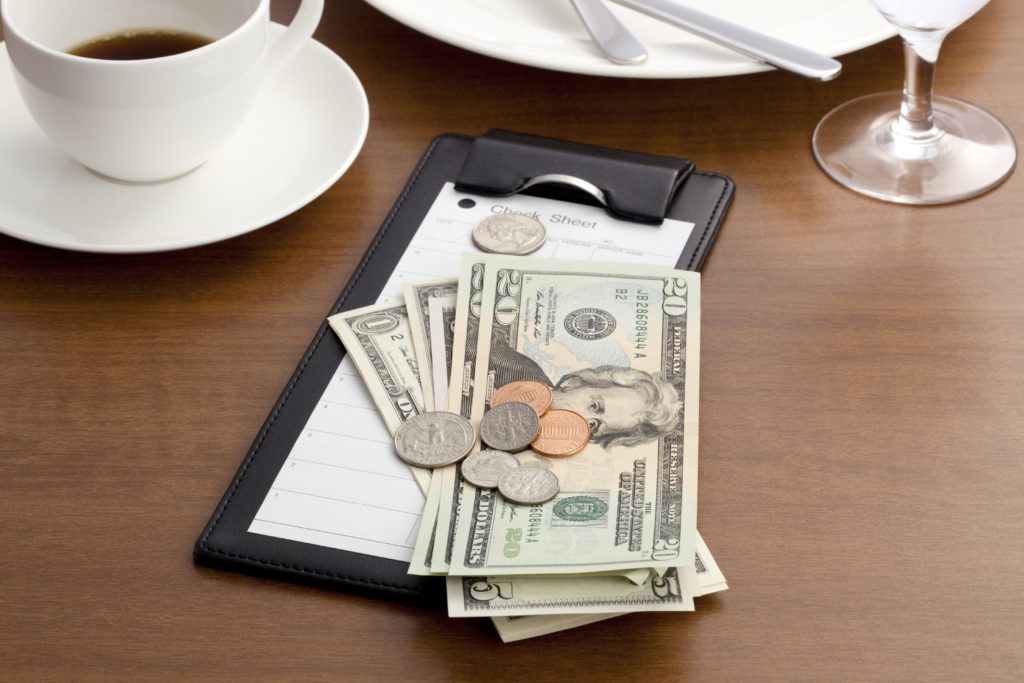As the election kicks into high gear, both former President Donald Trump and Vice President Kamala Harris have made proposals on the campaign trail to end taxes on tips.
It’s an idea that sounds broadly appealing, experts say, but may not affect workers substantially, if at all, since many low-wage employees don’t make enough to pay taxes.
WATCH: How the economy upended expectations of a recession in 2023
Confronted with the opaque American tax system, it’s catchy to say your tipped income won’t get taxed, said Margot Crandall-Hollick, a researcher at the Urban-Brookings Tax Policy Center.
But “it’s much harder to explain to people, hey, [with] that income, you’re not subject to tax anyway,” she said.
And in some cases, eliminating taxation on tips could potentially change behaviors in ways that actually harm laborers.
Where did the idea come from?
Trump raised the idea to end taxing tips at a June campaign rally in Las Vegas, home to the Culinary Workers’ Union.
“When I get to office we are going to not charge taxes on tips, people making tips,” Trump said, adding, “You do a great job, you take care of people, and I think it’s going to be something that really is deserved.”
Harris was also in Las Vegas when she announced she supported a similar proposal in August.
“When I am president, we will continue our fight for working families of America, including to raise the minimum wage and eliminate taxes on tips for service and hospitality workers,” Harris said.
Not long after Trump first raised the idea, a group of senators led by Sen. Ted Cruz, R-Texas, introduced legislation to eliminate federal income taxes on tips.
Who would be affected?
Broadly, only workers who get paid tips would see any changes. According to the Fair Labor and Standards Act, a tipped worker is defined as one who “customarily and regularly” receives $30 or more in tips monthly, a wide definition that encompasses millions of Americans. Yale University’s Budget Lab estimates that in 2023, there were 4 million workers in tipped jobs, comprising about 2.5 percent of the U.S. workforce.
Tipped workers tend to be younger — the median age is 31, compared to 41 for the median non-tipped worker — and earn lower wages, the Budget Lab found.
But it’s not clear how many of those workers would see economic benefit. Experts told PBS News that while the tax break would likely put some money back in the pockets of middle- and high-earning service workers, it’s likely to have no effect on lower-wage workers.
WATCH: Advocates concerned about workers with disabilities earning below minimum wage
Of the more than 2 million food servers across the country, half earn less than $37,000 a year, according to the Bureau of Labor and Statistics. Those workers can largely claim the standard deduction, reducing their tax burden, Crandall-Hollick said. But they also likely can claim other forms of tax relief, such as the Earned Income Tax Credit (EITC) and the Child Tax Credit (CTC).
More than a third of tipped workers didn’t make enough money to pay federal income taxes last year, Yale Budget Lab found, even before tax credits like the EITC or the CTC.
“You can’t go negative with taxable income. Exempting any more income from taxation is not going to help those individuals,” Crandall-Hollick said.
How would this proposal actually work?
There are three main approaches being discussed, Crandall-Hollick said:
Characterize tips as gifts. This is an approach she sees as legally problematic. That’s because federally, tips are intended to bridge the gap between the tipped minimum wage (which can be as low as $2.31 an hour) and the federal minimum wage of $7.25 an hour, with employers required to make up the difference if tips aren’t enough. Calling tips gifts would complicate that system, Crandall-Hollick said.
“I think a lot of tax lawyers would have an issue with that because [tips are] literally making up the difference between the sub-minimum wage and the minimum wage,” she said.
Categorize up to $20,000 of tips as non-taxable income. Under this second approach, some workers might see their gross income drop enough that they would no longer qualify for the EITC, though Crandall-Hollick also said some of the proposed legislation has language that could avoid that effect.
Create a new deduction, as proposed in Cruz’s legislation. Taxpayers would consider their tips income, then deduct them.
In any of these scenarios, Crandall-Hollick said, lower-income people are unlikely to benefit. She gave an example of a tipped employee making the subminimum wage of $2.13 an hour, working 40 hours a week for 50 weeks a year. That worker would make $14,500, of which $10,240 is from tips. But the standard deduction is $14,600, and since taxable income can’t be negative, this employee is already not paying taxes. Exempting her from paying taxes on the tip money changes nothing.
READ MORE: Most Americans say they pay ‘too much’ and see poor value in taxes, AP-NORC poll shows
She pointed to a piece written by her colleague Howard Gleckman, in which he notes that the Labor Department estimates the highest-earning 10 percent of wait staff make $60,000 or more annually.
“They’re probably in the 12-percent tax bracket. So every dollar that they get to exclude and not have taxed saves some $0.12 on their tax bill,” Crandall-Hollick said. It’s not nothing, but it’s also unlikely to be life-changing.
The change would “absolutely” impact moderate-income workers, said Heidi Shierholz, president of the Economic Policy Institute. But, she said, “the vast majority of tipped workers do not bring in huge tips in a fine dining establishment.”
What other ripple effects could this have?
Experts have offered a wide range of speculation about what the larger effects might be.
People might tip less if they assume workers would keep a greater share of the tips, Gleckman wrote.
Economists like Gleckman, Crandall-Hollick and Shierholz also worry that if the conversation becomes focused on taxless tips, efforts to raise both tipped and untipped minimum wages may fall by the wayside.
“I think there’s a lot of attention on taxes making people whole, taxes are going to solve the problem, when the real fundamental problem here is people aren’t paid enough,” Crandall-Hollick said.
Another potential outcome is employers and employees may try to game the system.
For employees, “I think the big concern is that it is going to create a huge incentive to recharacterize income in this way to be able to take advantage of this,” Crandall-Hollick said. “There’ll be some sort of creative way to characterize your income as tips and it’ll lead to more noncompliance, and it will just make the tax code more complicated and inequitable.”
“…the real fundamental problem here is people aren’t paid enough.”
Compliance for reporting tips is already spotty. In 2006, the most recent year for which data exists, the IRS estimates employees didn’t report about $23 billion in tips, or about half of the $44 billion in estimated tip income.
Meanwhile, if employers know that workers are no longer legally required to pay federal income taxes on their tips, they may feel comfortable offering lower base wages.
“If there’s some level of ultimate take-home pay that workers know they will accept to take a job, or to stay in a job … the wages needed to meet that level will have just gone down,” Shierholz said. She thinks any argument about helping tipped workers should ultimately focus on raising the minimum wage.
READ MORE: New York rings in 2024 with a pay bump for minimum-wage workers
But if there’s a benefit to the discussion about potentially ending taxes on tips, it’s that it’s “helpfully shining a light on tipped workers,” Shierholz added. She said she hopes that the conversation doesn’t end ultimately with taxes, but “brings it home” that “we also need to address the wage side.”
Who’s in favor of this?
The National Restaurant Association, whose members employ many tipped workers, supports Cruz’s bill.
“We appreciate that the idea of eliminating taxes on tips continues to keep restaurants and tipped servers in conversations happening on the Hill and around the election,” Sean Kennedy, the association’s executive vice president of public affairs, said in a statement to PBS News.
“These employees are vital to the hospitality that drives restaurants in every community. The No Tax on Tips Act is sensible legislation that could provide tax relief for them and their families, putting more money in their pockets at a time when we’re all feeling the squeeze of higher prices.”
The proposal has gained bipartisan support in Congress. President Joe Biden also backs the idea, White House press secretary Karine Jean-Pierre said.
Restaurant Workers United did not respond to an email request for comment, while UNITE HERE, a labor union representing some service workers, said it did not have any comment “at this time.”
A majority of Americans across political parties supports ending federal taxes on tips, according to an Ipsos poll released last month. But whether or not people felt it would help those workers was more murky, with 54 percent saying it would help workers be more financially secure and another 43 percent seeing it as an opportunity for employers to pay workers less.





